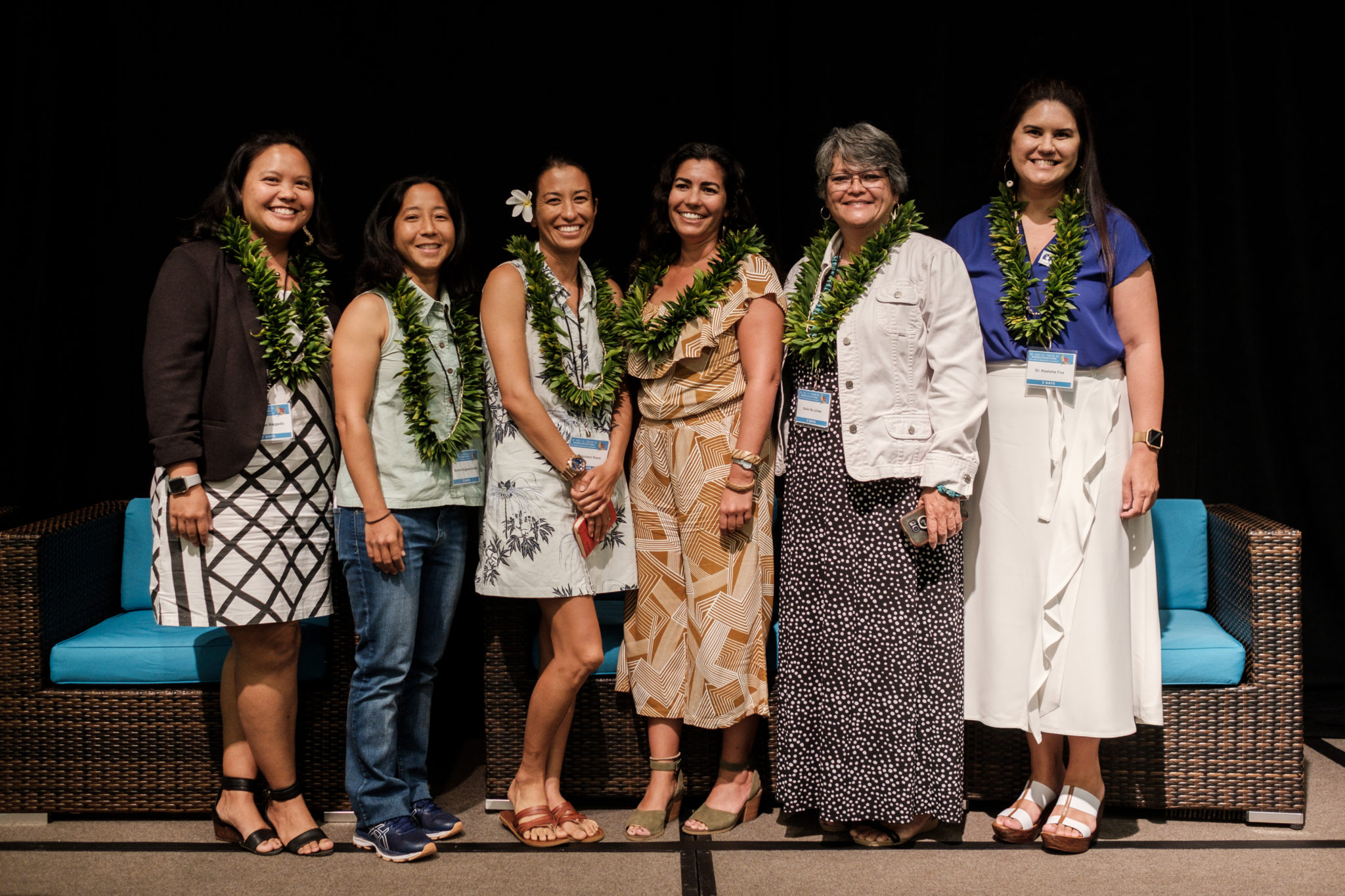Tuesday, July 9th, 2019 – Opening Plenary Panel – “Kāne and Kanaloa Are Coming: How Will We Receive Them? A Kānaka Take on Climate Change and Indigenous Resilience”
Important: Edit widget above and select correct menu

“Kāne and Kanaloa Are Coming: How Will We Receive Them? A Kānaka Take on Climate Change and Indigenous Resilience”
There are approximately 350 million Indigenous people worldwide, with rich cultures, languages, and histories that have developed through nations living for millennia in deep connection with their lands and waters. Hawaiʻi’s indigenous people, Kānaka ʻŌiwi, remain the keepers of ancestral knowledge which balances relationships among people, place, and their spirituality. Climate change influences on environment have become a determinant of Indigenous well-being and the health of native ecosystems. The empowerment of Indigenous women, in particular, is a powerful agent of change that strengthens their communities and self-determination in the face of environmental and other challenges. Across Ko Hawaiʻi Pae ʻĀina, relationships to place, approaches to addressing climate change, and resilience of wāhine Hawaiʻi has become a compelling opportunity to kiaʻi (guard), to hoʻoulu (grow), to ho‘ōla (enliven) our Hawaiian life-systems that include ourselves, our communities, and our ʻāina.
A new hui called the ‘Ōiwi Climate Collective describes wāhine perceptions of climate change from a traditional Native Hawaiian cultural lens. This plenary contributes their discourse on Indigenous worldviews, spiritual dimensions of ‘ike, and place-based dimensions of resilience by examining the role of environment for Native Hawaiians living in the context of a changing climate. We investigate the relationship between the environment and diverse aspects of the Native Hawaiian community in Hawaiʻi, drawing upon ancient wisdom and geographic approaches for island peoples. Namely, the resurgence of Kāne and Kanaloa and moʻolelo of revitalization. We use collaborative approaches across our disciplines to generate climate solutions. Addressing the 26th Annual Hawai‘i Conservation Conference theme, He ʻAʻaliʻi Kū Makani Au – Resilience in the Face of Change, this session elicits the many challenges faced by indigenous women in science, but also casts a spotlight on what they are achieving through their respective expertise. This opening keynote informs narratives that empower Kānaka ʻŌiwi to take action as opposed to narratives that can facilitate further displacement away from our lāhui, ʻāina, and akua.
MODERATOR BIOGRAPHY
Dr. Kealoha Fox is Ka Pou Kākoʻo Nui of the Office of Hawaiian Affairs where she directs agency initiatives for Mauli Ola. She is a state of Hawai‘i Climate Change Mitigation and Adaptation Commissioner (HRS § 225P-3) and serves as a member of numerous boards, consortia, and task forces including the Hawai‘i Greenhouse Gas Sequestration Task Force (HRS § 225P-4) and Institute for Climate and Peace. Dr. Fox received her PhD in Biomedical Sciences from the John A. Burns School of Medicine and has trained for half her life in traditional ‘oihana mauli ola including ho‘oponopono. She is co-author of Mana Lāhui Kānaka, focusing on Native Hawaiian resilience.
SPEAKER BIOGRAPHY
- Rosie Alegado was born and raised in Kaʻiwiʻula Oʻahu and lives with her family in Kahaluʻu. She is an Associate Professor of Oceanography and Sea Grant, director of the Center of Excellence in Integrated Knowledge Systems, director of the SOEST Maile Mentoring Bridge Program, a member of the Center for Microbial Oceanography (CMORE), and serves on the City & County of Honolulu Climate Change Commission. A student of Papakū Makawalu and kaulana mahina, Rosie incorporates these practices in reconstructing historical climate phenomena from nūpepa Hawaiʻi. In partnership with Paepae o Heʻeia, her group has tracked the influence of restoration, storms and multi-annual climate patterns on the health of Heʻeia Fishpond over the last decade.
- Aurora Kagawa-Viviani was raised on the slopes of Pūowaina, Oʻahu and is a PhD candidate in the department of Geography and Environment at the University of Hawaiʻi at Mānoa. Her research focuses on plant-water interactions in dry ecosystems and is driven by an interest in how human and ecological systems respond to stress. She sees current grassroots movements in ʻāina-based education, restoring familial and community relationships, retooling local resource governance, and re-establishing intergenerational and contextualized knowledge as key to increasing local adaptive capacity to climate and ecological change.
- Haunani Kane is from Kailua, Oʻahu. Haunani recently received a PhD in Earth and Planetary Sciences at the University of Hawaiʻi at Mānoa. An NSF Postdoctoral fellow at the University of Hawaiʻi at Hilo, Haunani’s research investigates how islands, reefs, and island people are impacted by sea level change and storms. As a scientist, voyager, and avid surfer, Haunani views the ocean as her classroom, the sky as a her blackboard and islands as models for sustainable living.
- Kalei Nu‘uhiwa is a PhD candidate at the University of Waikato. Her topic is utilizing the Papakū Makawalu methodology to uncover the natural environmental indicators associated with Lono during the Makahiki season. Cofounder to ʻAimalama, which is a community movement to create solutions to adapt and survive the changing climate in Oceania. The movement utilizes two traditional practices of kilo (observe/predict/prepare) and kaulana mahina (lunar calendar & natural environmental cycles) to empower ourselves to make the best strategic decisions to survive. If we study something well enough, we are no longer afraid of it and can assure that our people and culture will thrive.
- Noelani Puniwai, Assistant Professor, Kamakakūokalani Center for Hawaiian Studies is passionate about cultivating the next generation of students to mālama ʻāina. Hailing from Puna on Hawaiʻi Island, she and her children love to huakaʻi and learn the moʻolelo of the ʻāina. Her research interests include ancestral Hawaiian knowledge regarding the ʻāina, coastal ecosystems, cultural geography, seascapes, climate change, and most definitely – Kanaloa. Noe believes that we can use the rigor and methodologies of pono science, the foundational wisdom of our kūpuna, and our experiential daily practice of aloha ‘āina to awaken responsible action for the future of our Hawaiʻi.
